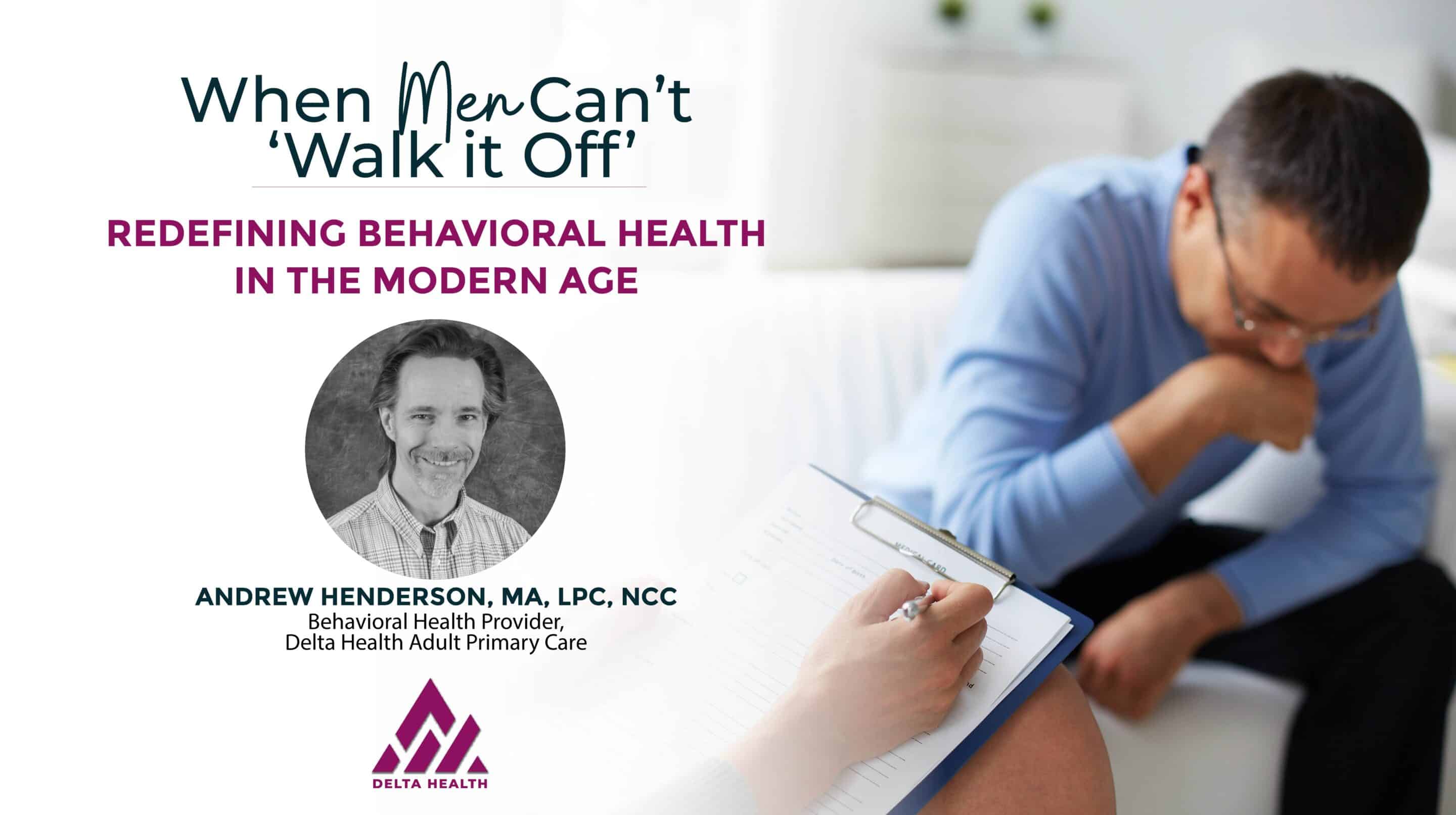Redefining Behavioral Health in the Modern Age
Andrew Henderson, MA LPC NCC
Behavioral Health Provider, Delta Health Adult Primary Care
According to studies over the last 10 years, approximately 75 percent of behavioral health therapists in this country are female. Those figures certainly correlate with my own experience of being a man who is also a behavioral health professional. Women absolutely outnumbered men in my graduate studies program. When I began to practice mental and emotional health counseling at my first agency, I was the only male therapist on staff for a long time. Over the last few years, I have observed more male therapists entering the profession here on the Western Slope of Colorado. Currently at Delta Health, we oddly have more male therapists than females (at this moment; that is not the norm). But across the nation today, mental and emotional health therapy remains a field dominated by women.
That is why I thought it would be a great opportunity to explore the experience of being a male therapist working with male cliets and how we can address the stigmas surrounding men’s behavioral health to.
STIGMA AND VULNERABILITY
For many people, even in today’s world, there is still a certain stigma around behavioral and emotional health treatment, particularly among men of a certain age. I have witnessed this firsthand working in the Delta Health Adult Primary Care Clinic for the last few months. One of my tasks is to consult with the clinic’s doctors and medical staff each morning to identify patients they know to be struggling with depression and/or anxiety. Throughout the day I endeavor to meet with these patients and offer mental and emotional health counseling and support. A small number of the older men are appreciative and open-minded (and I am now working with some of them). But in my experience, more often these older men are at least skeptical or resistant, becoming somewhat closed-off when they hear I am part of the Behavioral Health team; one or two have even taken offense at the very idea of meeting with a therapist.
I believe there are two primary reasons for older men’s aversion to therapy. Firstly, countless men among the preceding generations were raised with what I would call the “Boys Don’t Cry” mentality; raised and taught by their parents to be tough and strong, to silently endure, to not be a burden – and certainly not to express themselves or their emotions openly. Of course, there are merits to the old ways, but also drawbacks. Imagine how many soldiers and policemen (and others) believed they had no choice but to repress PTSD or similar concerns for the last 100 years or so. Secondly, society’s beliefs about people suffering from mental illness are often stereotypical and discriminatory (that the person in question may be weak, or dangerous) and this can impose and/or reinforce a negative internal belief within the patient (that they could be weak or present a danger) – this is public-stigma creating or reinforcing self-stigma.
“It’s scary!” A declaration and an admission from a patient I met last week – his comment was his reflex response to my invitation for a short series of therapy sessions to explore his high scores on the hospital’s depression and anxiety assessments. (We’ll call him John Smith). A man my age (late forties), John explained that his primary concern about therapy was “having someone inside his head” (fair enough, and a somewhat common concern that I hear from men of all ages – and how I wish I had such power!). His second concern was around the stigma of behavioral health treatment. John also alluded to the “Boys Don’t Cry” mentality, and we chatted about these things for a bit.
NORMALIZATION AND NUANCE
In my profession, I often think about how best to tackle these issues with middle-aged and senior men. Certainly, with many of them, my gender may give me some advantage. Older men face issues of prostate cancer, erectile dysfunction, and even histories of being victimized in various ways; they sometimes decide upon what they perceive to be the least uncomfortable option and choose a male therapist in hopes that the counselor may better relate to particular male issues. I have been in this profession long enough that when a man voices a specific matter, I can often and honestly say “I have worked with several men on that…” and the knowledge that the therapist has explored the issue(s) with other men can have a significant and normalizing impact, and reduce patient anxiety.
In the case of John Smith, it was easy for me to establish rapport and put him at ease – he wore a Batman tee-shirt, I told him I was a Superman fan myself… and after five minutes we scheduled an appointment. At other times, I use therapeutic skills during the initial meet-and-greet, such as reflective listening, summarization, and even humor (when and where it may be appropriate). If I can use the time well to challenge an idea, to plant the seed of a new perspective, to provide an intervention, then I can point out that we’ve just had a very brief five-minute therapy session – and this can lower patient resistance and anxiety. I’ll view the assessments beforehand, and sometimes start with what is most present for the patient – I might begin by asking the patient “What has you feeling so fatigued?” Or disinterested in life, or irritable, etc.
As for the “Boys Don’t Cry” mentality, I sometimes will describe the body as a machine, comprised of systems that each serve a purpose – the heart pumps blood, the brain computes information… and the tear ducts provide emotional release and processing. The tear ducts exist for a reason, as part of the system, with a function to perform. Men can usually relate to the machine analogy.
ONE PATIENT AT A TIME
For the men I work with in therapy, providing a place of understanding (a safe space) is essential. Within the hospital’s Integrated Behavioral Health model, the process starts with the therapist and the first meeting in an exam room. I myself must be the safe space, normalizing emotional and verbal expression, reducing stigma, and empowering men to take what is often a brave and trusting first step.
If you are interested in learning more about the Behavioral Health Services available at Delta Health Hospital and at our Delta Health Primary Care Clinics (Delta Health Family Medicine, Delta Health Adult Primary Care, and Delta Health West Elk Hotchkiss) visit deltahealthco.org/behavioral-health/ or call 970.874.7681.


